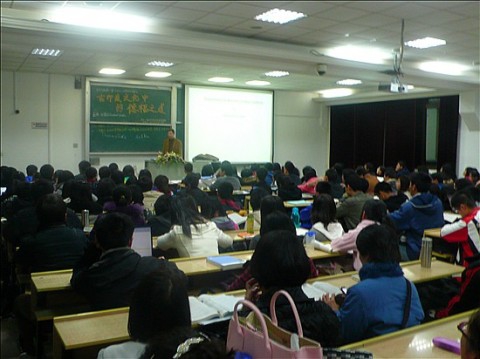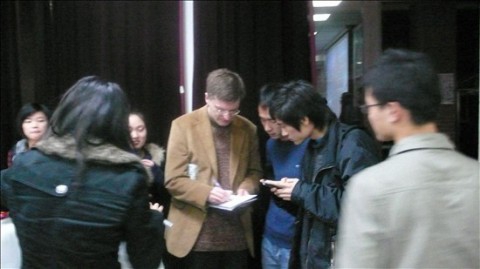
2010年3月30日,第十一届Sophia人文节——幸福的朝圣路系列讲座之三“古印度文化中的德福之路”在3108举行,主讲人为哲学学院副教授孤鹤(Eberdhard Guhe)。
孤鹤老师以古印度哲学为开头,对古印度哲学做一个简单的说明,接着才引出本次的主题—古印度文化中的德福之道,先概括古印度文化中的德福之道,然后再详细说明,以独特的视角来讲解德福之道。
孤鹤老师开张名义,“The Four Noble Truth”,为我们讲述遭遇困难的必然性,告诉我门要克服困难,进一步说明,1)the Nature of Suffering. 2) Suffering is Origin 3) Suffering is Cession .最后讲到The Path Leading to the Cession of Suffering。随后讲到“The Five Aggregates of a Person”,人是五方面的统一体。Fist,“form” or “matter” .Then, “session” or “feeling”. What’s more,“ perception” “conception” “apperception” “cognition” or “discrimination”. At last, “conscionsness” or “discermment”. 其中讲到“The puggale as a Bundle Concept of a Person”引用Woodward 的一句话 thus let my feeling be ; thus let my feeling not be……”
之后层层深入,说明德福之道。从 “The Concept of Non-self” ,“The Three Properties of the Phenomenal Self in Thomas Met zinger’s self Mood Theory” ,“Dan zahavi’s Criticism of Met zinger’s Self Model Theory”, ‘The 4 “Immeasurable”, “Loving-kindness”, “Compassion”, “Equanimity” Joy in the Joy of Others’. “The Miness-Property of the Phenomenal ” 。最后以“The Doctrine of Monentarines”为小主题结束。

虽然此次英文讲座,有一定的语言障碍,但参与人数并不逊色于其他的中文讲座。在讲座结束之后,不少同学前来与老师交流,孤鹤老师耐心地为大家解答疑问,大家悦色盈于脸。
本场讲座圆满落下帷幕。